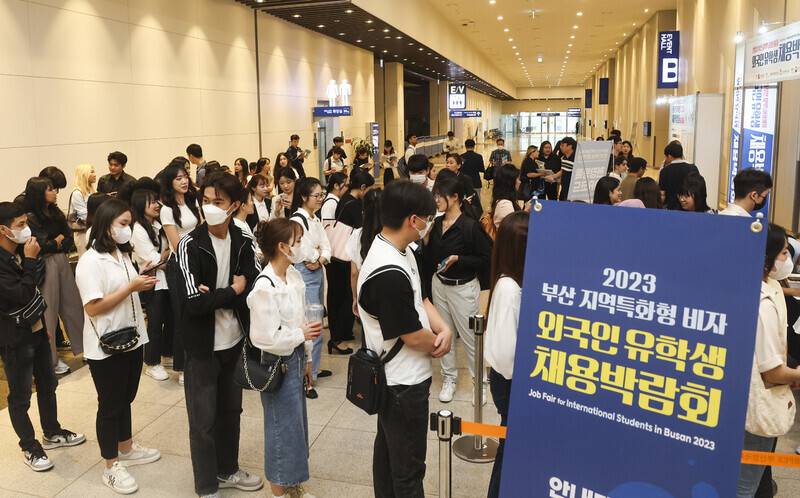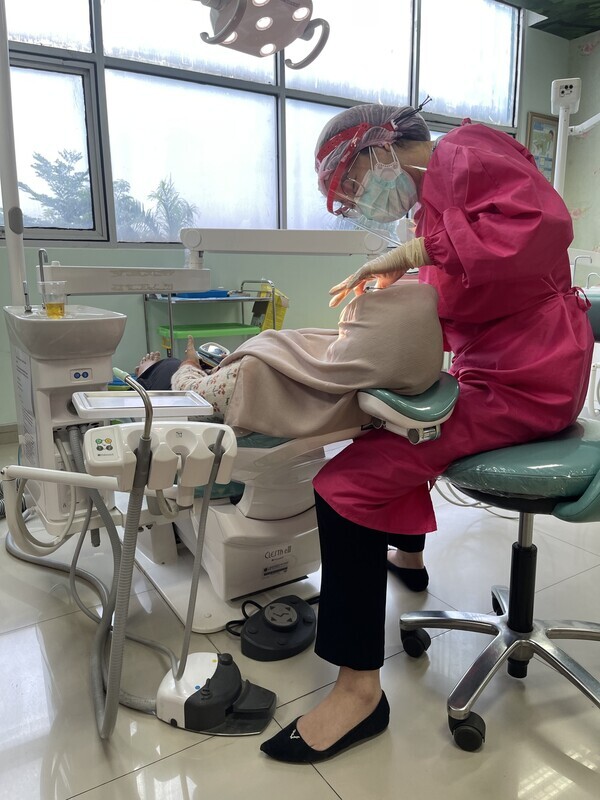hankyoreh
Links to other country sites 다른 나라 사이트 링크
‘I’m not illegal’: Foreign students say they’re tired of being asked to prove they belong in Korea

Editor’s note: The South Korean government and university authorities’ policies for international students have come under discussion in the wake of the en masse deportation of students by Hanshin University.
The incident in question was not limited to one particular institution; it was highly emblematic in illustrating the limitations and crises that South Korea’s universities and local communities have been facing. In this special feature, the Hankyoreh explores the current state of international student policies, along with their problem areas and possible alternatives.
Muhammad Ziya, a 25-year-old from Uzbekistan, plans to graduate from Inha University next February with a degree in international trade. His path toward earning a diploma in a foreign land has been a complicated one, but now he finds himself more uneasy than ever before. His fear is that he may have to leave Korea.
His student visa is set to change shortly to a job-seeking visa. He has to extend his stay every six months, and each time he needs to prove that he has the necessary bank balance for his sojourn status.
“I get stressed just thinking about my visa,” he said.
What unsettles Ziya most of all is how visa reviews are conducted in Korea. He came to Korea simply for the sake of a better education and bigger dreams. For five years, he has studied diligently to earn his diploma.
But at every visa review, he has to prove that he is not a lawbreaker, and that he will not be an “illegal” resident of the country going forward.
“Every time we change or extend our visas, we foreign students are treated like people who might cause harm to others — like murderers, even,” he said.
Remarking on the deportation of Uzbek students from Hanshin University last month, he described the incident as an “extension of that attitude.”
The reason Hanshin University deported students who failed to meet the Ministry of Justice’s financial capability documentation requirements was out of concerns that they might leave the school and become undocumented residents.
The actions of Hanshin University — which saw its students as potential illegal aliens when they still had time left in their sojourns — are a familiar form of mistreatment to Ziya, whose legal status is constantly being questioned.
This perspective of treating foreign residents as targets for monitoring and punishment is also evident in the current administration’s guidelines. In its guidelines for international student visa issuance and sojourn management, the Ministry of Justice lists review standards based on educational attainment, financial capabilities, and nationality.
Students from countries in the Organisation for Economic Co-operation and Development (OECD) are exempted from having to submit various documents. But those who hail from other Asian countries — a segment that accounts for 90% of all international students in Korea — generally face more stringent reviews.
Certain countries that account for large numbers of undocumented residents, including Uzbekistan and Vietnam, are regulated even more heavily.
“If the South Korean government continues with this racist attitude, talented and educated foreigners are going to leave South Korea,” Ziya warned.

Indeed, some international students are already walking away. According to figures from the Ministry of Justice, the number of foreign nationals enrolled in degree programs in South Korea stood at around 140,000 as of 2022, or double the 70,000 recorded in 2010. (According to the Korean Educational Development Institute, a total of 181,842 were counted in 2023, including those in degree programs and language and other study programs.)
But only 16% of those students found employment in South Korea — less than half the 37% rate in neighboring Japan (as of 2021).
Not only is it difficult for these foreign nationals to maintain a visa while looking for work, but they are also limited as a rule to employment only in clerical and professional positions after graduation.
It’s a situation where they are unable to work where the actual demand for international students is: at SMEs and in production positions. As a result, they end up going back home or leaving for a third country.
With graduation failing to translate into employment, international students are unable to envision a future for themselves in South Korea.
Enkhjin, a 22-year-old Mongolian student attending the Korean language center at Hanyang University’s ERICA Campus, plans to continue studying for another semester or so before gaining admission to study business administration. But she too is planning to return to Mongolia once she graduates.
“As a foreign woman, it’s too hard to find anywhere to work in Korea,” she said.
“If I go back to Mongolia, I’ll have opportunities to work at large corporations,” she explained. “Unfortunately, the likelihood that I will leave Korea is currently high.”
Another issue is the insular social environment. Maria, a 25-year-old dentist from Indonesia, is currently planning to pursue graduate studies in South Korea. She is fluent enough in English and Korean to serve as an interpreter when conferences are held in Jakarta.
Maria is a big fan of Korean culture, but she does not intend to stay after graduating either.
“I’d prefer to run a dental clinic in Indonesia that Koreans there feel like they can trust and visit,” she explained.
Jokingly expressing concerns about the high prices in South Korea, she said, “I might end up having to eat triangle kimbap every day.” But a more troubling prospect for her is the likelihood of “being treated like an outsider for the rest of my life.”

While the institutional and cultural barriers for international students have grown more daunting, universities have been facing a collapse.
The Ministry of Education and Statistics Korea estimated that around 370,000 students would be entering South Korean universities in 2024 — less than half the 860,000 recorded in 2000.
The situation is even more dire outside the greater Seoul area. Statistics Korea predicted that by 2040, universities outside of the Seoul area will fail to meet their incoming student quota by 40.4% (84,296).
Some have suggested physical restructuring as a solution — including the integration and abolition of colleges — but the situation is not a simple one. Another factor that must be taken into account is the sense of urgency in local communities, where the absence of a university means no influx of younger residents. Without international students, a number of local governments face the threat of collapse.
It’s a situation the government is well aware of. Awareness of it is one of the reasons the Education Ministry announced plans in August to increase the number of international students in South Korea to 300,000 by 2027.
But simply increasing the numbers is very likely to have side effects. In a situation where South Korea is less and less preferred as a destination for overseas study, a mere increase in quotas will leave many vulnerable to brokers looking to make money off of visas.
Indeed, Justice Ministry data submitted last January to the office of Transition Korea lawmaker Cho Jung-hun showed that between 2018 and 2022, the rate of international students becoming undocumented sojourners after arriving with a student visa roughly quintupled from 1.38% to 7.13%.
University-affiliated Korean language centers are also bound by the same system. The link between matriculation and employment is a key element in the pathway from language study to college admission and eventual job-seeking. The breaking of that link makes recruiting students a difficult task for the language centers, which are tasked with providing a preparatory system for college admission.
From the students’ standpoint, there is no reason to travel to South Korea when there is no guarantee on the ability to find work there and the fees for language study are steep.
For universities in the Seoul area, there is some demand among students who also hope to see South Korea. But universities outside of the greater Seoul area are put in the position of having to take measures to recruit students that may entail future risks as they work to ensure tuition funds for their language centers.
Experts stressed the need for a fundamental change in attitudes from the government and society in general. In particular, they said the focus of the system needs to be shifted from punishment and monitoring to support for employment and settlement.
“For Korean and foreign students alike, the most basic objective is ultimately to graduate from a university, and that’s an area where we only have regulations, without offering support,” said Kim Do-gyun, an expert on immigration policy and special professor at Cheju Halla University.
“If we can maintain a stable ladder leading from graduation to employment, that will naturally take away the incentive for international students to become illegal residents, and it can also resolve some of the difficulties that universities are going through,” he suggested.
By Lee Jun-hee, staff reporter
Please direct questions or comments to [english@hani.co.kr]

Editorial・opinion
![[Column] When ‘fairness’ means hate and violence [Column] When ‘fairness’ means hate and violence](https://flexible.img.hani.co.kr/flexible/normal/500/300/imgdb/original/2024/0516/7417158465908824.jpg) [Column] When ‘fairness’ means hate and violence
[Column] When ‘fairness’ means hate and violence![[Editorial] Yoon must stop abusing authority to shield himself from investigation [Editorial] Yoon must stop abusing authority to shield himself from investigation](https://flexible.img.hani.co.kr/flexible/normal/500/300/imgdb/original/2024/0516/4417158464854198.jpg) [Editorial] Yoon must stop abusing authority to shield himself from investigation
[Editorial] Yoon must stop abusing authority to shield himself from investigation- [Column] US troop withdrawal from Korea could be the Acheson Line all over
- [Column] How to win back readers who’ve turned to YouTube for news
- [Column] Welcome to the president’s pity party
- [Editorial] Korea must respond firmly to Japan’s attempt to usurp Line
- [Editorial] Transfers of prosecutors investigating Korea’s first lady send chilling message
- [Column] Will Seoul’s ties with Moscow really recover on their own?
- [Column] Samsung’s ‘lost decade’ and Lee Jae-yong’s mismatched chopsticks
- [Correspondent’s column] The real reason the US is worried about Chinese ‘overcapacity’
Most viewed articles
- 1Could Korea’s Naver lose control of Line to Japan?
- 2[Column] Welcome to the president’s pity party
- 3[Column] US troop withdrawal from Korea could be the Acheson Line all over
- 4Naver’s union calls for action from government over possible Japanese buyout of Line
- 5[Editorial] Korea must respond firmly to Japan’s attempt to usurp Line
- 6Korea cedes No. 1 spot in overall shipbuilding competitiveness to China
- 7[Editorial] Yoon must stop abusing authority to shield himself from investigation
- 8[Column] When ‘fairness’ means hate and violence
- 9Korean opposition decries Line affair as price of Yoon’s ‘degrading’ diplomacy toward Japan
- 10Second suspect nabbed for gruesome murder of Korean in Thailand, 1 remains at large